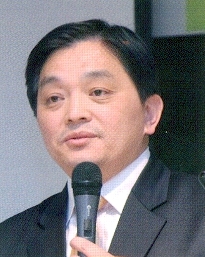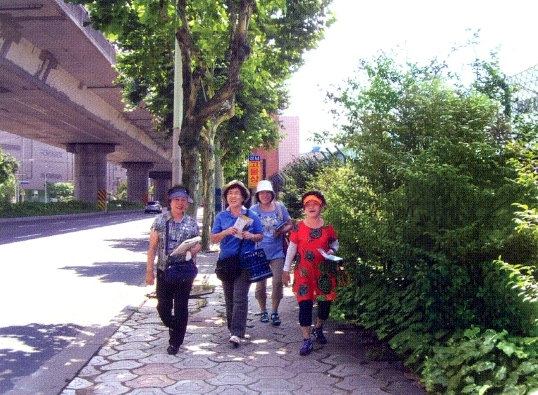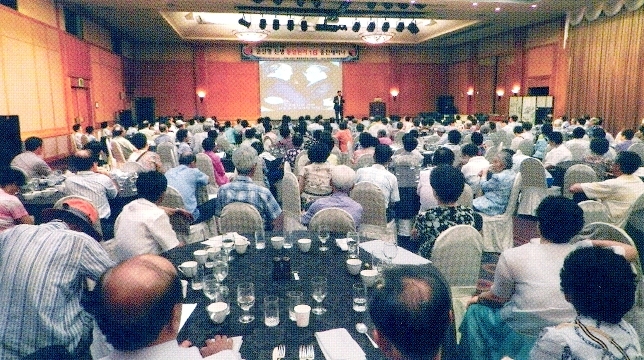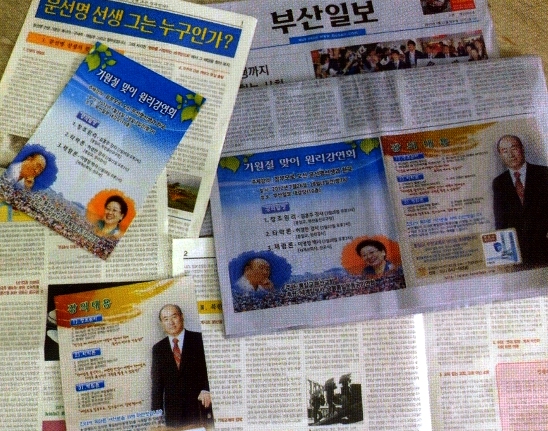![]()
The Words of the Hwangbo Family
|
|
The Words of the Hwangbo Family |

Mr.
Gun Hwangbo, whose Church Support Department office formulates
strategy for church growth in Korea; here he is pictured addressing a
meeting for nationwide church leaders and other members with public
responsibilities, earlier this year.
Question: We hear membership of the Korean church is growing. What factors have brought this about?
I believe the first reason behind the results we've achieved is a successful consolidation of churches, which was suggested by the Foundation chairman [Kook Jin nim].
Of course, there are a few churches that are suffering from the aftereffects of church integration. Not all of them were successful. Those that were not are very few. If churches still have conflicts, it is mainly because the problems those churches already had, and have had for quite a while, were brought to light due to church integration.
Other than that, the integration has brought about many changes in the environment to begin with. Many church buildings were remodeled or built from scratch and the surrounding environment cleaned up. Thus, the long-cherished dream of the Korean church to change the atmosphere of the church and reduce the number of A-type church buildings was achieved.
With the remodeling of church buildings carried out at this time, we also built many educational centers nationwide. The number of second generation members is increasing, and we needed places to educate them. All in all, it is my assessment that the church integration promoted by the Foundation chairman and the consequential improvement in the environment has played a major role in the growth of the church.
The second reason is the capability of the church leaders. The growth of a church depends greatly on the capacity of the church leader. A church will grow if it has a good church leader, even if it has difficulties. On the other hand, if the church leader is not very capable, the church will have trouble growing even if it is in the best of environments.
For this reason, one of the Foundation chairman's policies was to relieve the less capable church leaders of their responsibilities. In their stead, better qualified church leaders were assigned to the mission. At the same time, we also carried out many workshops strengthening church leadership ability.
One of the ways of improving the leadership of church leaders in Korea is the teaming up of church leaders. In the past, each church leader worked alone; that is, the church was centered on one church leader. No however, we have two church leaders working together in each church.
In addition, some churches are also educating members in leadership and making them into church workers under their respective churches. In other words, they are nurturing mid-level leaders. Among the congregations, there are many excellent members who have the capacity to carry our pastoral duties. A case in point is Gangdong church in Seoul. There, twelve members have been trained as Divine Principle lecturers. In fact, they give even better lectures than the church leader!
A third reason is that a system has now taken root. The Korean church did not have a system. The most important one of which is the system of training the members for a church mission. Another system that was needed was the witnessing system, and it is now in place.

Mr.
Hwangbo says that street witnessing is great for training, but
produces relatively little result compared to speaking to people with
whom one has a firm relationship; even so, Korean members maintain
the tradition of going out to talk to the people.
Question: What is the witnessing system?
Guests may begin to come to church, but if there isn't a system through which they can be rooted into it, they will leave because they can't adapt. It is important to have such a rooting system. More important than witnessing even, is the question of how those who come to the church can remain in it.
Next, once they have joined solidly they need to be nurtured spiritually. How should we nurture them? We are taking a special interest in this. There are also books that tell you how to nurture them and help bring them to be solid members of the church.
We have made a textbook that teaches you how to bring someone to committed membership. For example, it tells us that the most important period for a new members to put down roots in a church is the first few months. The first three months are crucial. During this three-month period, we need to follow a three-to-one principle. What that means is that, when a new member comes to church, in order for them to be rooted in the church, they need to form good relationships with three existing members. When a new member comes to church, the most important thing is to take care of them with love rather than trying to teach them from day one. We need to care for that person.
The existing members first need to care for new members with love -- rather than trying to teach them the Divine Principle forcefully. In the latter case, new members tend to leave the church. At first, the existing members need to take care of them with love, and teach them things they are curious about, share meals with them and so forth. And while caring for them with such warmth, they need to follow the curriculum in this book, which is very simple. This curriculum carries the core content, which is explained very simply.
This book teaches you about God, about human beings, and about the spirit world. It also tells you about the existence of Satan and how he works, and that he can test you at any time. If you give him so much as an inch, he will come and drag you away. Using such simple words, we explain to our new members about the existence of Satan and so on.

The
Korean church has produced handbooks to help members witness
effectively.
Question: Do you give this book to new members?
This book is used to teach them, sometimes by church leaders, but mostly by members. The members first study this book and then teach what they learn to new members one-on-one.
A good thing about this strategy is that the two can come together to discuss this book, which can be a lot of fun. By so doing, a relationship is formed between the two, and when they want to ask about something, they can talk about it right away.
Once new members are solidly in the church and have become regular churchgoers, there is a more advanced book members can use to nurture them. This book includes passages from the Bible, Divine Principle and True Parents' speeches. When Christians come to our church, they need to find content that is based on the Bible.
So, for example, when we talk about the give-and-take action, we use Bible quotes to explain the principle behind it. We use the Divine Principle explanation, and then we quote True Parents words. We have selected the easiest material from True Father's speeches to explain the gist of the give and take action, and brought together such content in this book. This book allows for thirteen weeks of study, and at the end of that time we consider the nurturing of new members to be complete on the basic level.
The Korean church has created a four-stage system of witnessing, training and nurturing. When you reach the top of one stage, you enter the next one and so forth. This system has now taken root, and I believe it has played an important role in the growth of the church.
Another reason is the KPI system. KPI stands for Key Performance Indicator. At the beginning, a great number of church leaders were resistant to this. However, once the system was implemented, we could see clearly what results we were actually achieving through the activities we were doing in the field.
KPI give an accurate assessment of by what percentage our membership has grown in a particular month.' and whether donations have increased. Thus it provides very good data for evaluating our church. When there is a problem, we can work on a solution right away. If a church has a problem with Sunday Service, we can often suggest a solution right away to make an improvement. Thus, the KPI system has been very effective.
Now, based on KPI results, church leaders can know when their church is registering negative growth, and they can make effort to improve things.

Events
such as the one pictured here are the result of long-term investment
in building relationships in a community, on the basis of which
people more easily accept invitations to hear about our teachings.
Question: What is the most effective witnessing method in Korea?
In witnessing, the Korean church employs two methods. The first is street witnessing, which entails coming face to face with people you don't know and giving them copies of the autobiography, or leaflets, or the newsletter we have recently started making. [Mr. Hwangbo shows a newsletter] We hand these out during street witnessing.
The other method of witnessing is relationship-centered witnessing. Nowadays, people generally tend to wave aside leaflets being handed to them by someone on the street. What is more, they rarely open their hearts to strangers. This is because our society has become one where people don't so easily trust each other. Street witnessing is usually carried out to train our members. It is great witnessing training. So, we go out and visit homes, we knock on doors and try talking to people, we walk around on the streets and give out copies of the autobiography and leaflets, but only a few accept what we hand them or are really witnessed to. Still, that is in itself excellent training. Through this process, one becomes a very strong and spiritual messenger. One needs to train in witnessing, and one of the best ways is to go street witnessing.
However, it is the relationship-centered witnessing method is the method through which we actually bear fruit. In this method of witnessing, you need to meet constantly with your witnessing contact and form a close relationship with him or her. After meeting with a person regularly, maybe sharing meals together, when you feel that you have formed a close relationship and that person has opened his heart to you completely, you can convey our message to them and bring them to our workshops or to the church. This is the best method to adopt. In restoring your tribe, if you do not employ this method you will find it difficult to achieve your goal. This is why the Korean church is focusing on training its members to form continuous relationships.
This is how we do it. To give an example, most of the people engaged in witnessing activities carried out under the Korean church are the wives, and a great number of blessed wives in Korea are from overseas. Many are Japanese, and they have trouble forming relationships because they cannot communicate freely.'
Korean rural districts are divided into cup (district), mycon (township) and dung (ward), aren't they? We assign blessed families to each place, usually three to each, and ask them to take responsibility for that area. Even if there are members in that location who are witnessing to others, the members assigned there will concentrate just on that district. They focus on serving the needs of that community, finding out what is needed (rather than having their own idea about what to do), and helping in those areas -- even with public events the village is organizing, for example. If they do that, then of course they come to know the leaders in the local society. The point is, they work to be genuinely helpful, and that way they begin to build relationships with others. Even if someone is against our religion -- "Oh you are from the Unification Church!" -- in the end they understand that the members' hearts are genuine. Over time, close relationships develop, and if you are not a Korean it doesn't matter anymore. It becomes natural to invite people to come to an event at which true family values or the Divine Principle are taught. Those serving in their areas can communicate with their local church leader, and ask him to come and speak in their area on a certain topic. In every town and village there are quite good assembly halls, and the church leader arranges with the witnessing workers to bring those they have formed relationships with to attend a talk he, or another central member, has prepared.
Then if those who come are impressed by the lecture, they are matched up with blessed families in the locality, one-on- one, so that they can continue to strengthen their relationship with our church members. This is how we carry out relationship-centered witnessing, and this method is quite effective. This is really like the grassroots or home church activity True Father has spoken of many times.
Although in the past our members could not always find the courage to bring people to our church, through this method many members are confidently inviting people, and our congregations are growing. In restoring our tribe too, the best way is to become close to them through relationship-centered witnessing and then to bring them to our church.
In Korea, not only our Unification Church but also other Christian churches use relationship-centered witnessing. Nowadays, our society is becoming individualistic, and human relationships are breaking off left and right. This being the case, whereas in the past you could meet someone on the streets and they would open up their heart and say, "Oh, really? Is this a new teaching?" now everyone is rather blocked. Therefore, you need to meet constantly with someone to build trust so they can open their heart. For this reason, most of those churches that have adopted the relationship-centered witnessing method are growing faster. The churches that are still concentrating on street witnessing may succeed in training their members, but they are not as fruitful in terms of growth. Those churches that have steadily carried out relationship-centered witnessing for a year or two have seen much growth.

The
church advertises workshops on Divine Principle and the significance
of Foundation Day in local newspapers and produces newsletters and
leaflets about Father's life that are intended to encourage Koreans
to read his autobiography.
Question: It seems a crucial shift.
It's very important. A good example of this is Hampyeong church. The Hampyeong church building is now not big enough to house all the people who are coming to church, so they need to build a new one.
In that church, the members are also concentrating on strengthening their relationships with one another, so any conflicts or problems that existed amongst the members have all been resolved. They are also forming constant relationships with local residents by, for example, performing moxybustion treatment, cleaning the retired persons activity center and so on. In this way, non-Korean blessed members are provided with opportunities to form relationships with local people, and that reaps many benefits.
Question: I believe many in Korea have read Father's autobiography. In general, what is the response to the book?
Innumerable copies of the autobiography have been handed out, but the honest truth is that many of them stay on bookshelves. Those who receive the book should read it, but nowadays people don't like to read books. They have gotten used to looking up summaries of books on the internet or smartphones, and now the culture of reading books is disappearing.
So when they receive the book, they say "Thank you," and take it home and put it in their bookshelf, instead of reading it. This being the case, many members started worrying about what was to be done about it. You may have seen a small booklet printed by one church named "A Father's Tears." That booklet contains the gist of Father's autobiography, and the page size is quite small. These booklets are handed out in subways or such other places, and people like to receive them and read them because they are quite short and can be read quickly. And when they read this booklet, they find very intense content which moves them, and they think to themselves that they should read the autobiography. And these people then buy the autobiography -- or if they have it at home, they take it off the bookshelf and read it.
Actually, reading the autobiography cover to cover is even more effective than attending a three-day Divine Principle workshop. This is because those who read the book from cover to cover come to form a relationship with Father. Not many people read from the beginning to the end, however. That's the problem.
Someone came up with the idea of printing a newsletter entitled "Who is Rev. Sun Myung Moon?" that carries the core content of the autobiography, As a Peace-loving Global Citizen.
The idea is that when you read this newsletter, you become curious about the autobiography and you go on to read it. The newsletter also tells people about who Father is. When they read this and see Father declared as the Messiah and the Savior, they will want to learn more about Rev. Sun Myung Moon! In this manner, we are finding ways to bring people to read the autobiography. We are continually modifying our approach.
Nowadays, it is quite hard to persuade someone to go to a workshop. It is easier to persuade them to read the autobiography from beginning to end.
Some members read the autobiography with their witnessing contacts, even visiting their homes to read the more important chapters together. They take a copy of the autobiography with them as a gift, or the person they are witnessing to may already have a copy on their bookshelf of course. They persuade their witnessing contacts that when they read the book carefully they will find out who Sun Myung Moon is.
Members sometimes suggest meeting regularly, maybe twice a week, to read the book together, and they visit their witnessing contacts and hold Hoon Dok Hae together and talk the book over with them. I think that is a very good way of witnessing, and good for those who like to read books.
Another aspect in witnessing are the witnessing centers. Most large churches in Korea have created one. In the witnessing centers, Divine Principle lectures can be given at any time, whenever someone comes to the Center. This being the case, those churches that have this system in place are growing remarkably.

Mr.
Hwangbo states that street witnessing for training is good, but
produces few results compared to witnessing to people we know
Question: How do you know which churches are growing?
We are also promoting another project related to church growth, which is the church Consulting Project, and it has been well received. We visit a church and make a diagnosis. People need to receive medical checkups regularly don't they? The diagnosis comes in and they are told that they are healthy or that they have a problem. This is similar to that. We have created a diagnostic system to examine the health of a church. We go to a church and analyze it, so we can determine how healthy it is.
When a church has problems, the system helps, and even when it does not have a problem, it is good to run an analysis because you can find out if any problems are about to arise. This consulting program is specialized for each church, and the churches all appreciate it.
We do this with the church leader and the church committee. We hold a group discussions and ask questions such as, "The church is weak in this area. We need to strengthen this aspect. How can we go about it?" Members can make suggestions of improvements to make. In this manner, we can help resolve problems in a church. This has been well received in the field. I believe these programs have been carried out for the first time in Korea.
To aid in this process we have created a questionnaire for the members. It contains questions under 100 categories. We made this questionnaire with experts in the consulting business, so we believe that it is very good. We also interview members. This gives us valuable insight, which we can put with information that comes from the questionnaires and the results in terms of numbers that the churches regularly report.
Through these efforts, we can clarify that the Korean church is currently growing each year. Not spectacularly, but gradually in stages.
I am of the opinion that, after the Foundation Day, a great number of people in Korea will join our church. Our providential fortune is increasing, and we have a system and a curriculum ready. In the past, it could have been a problem if too many people came at once, because we weren't ready for them. Now, however, we are really ready.